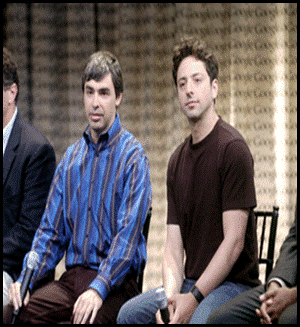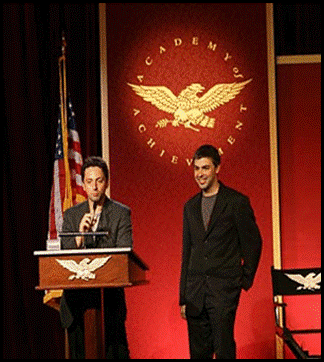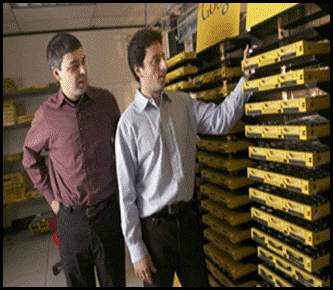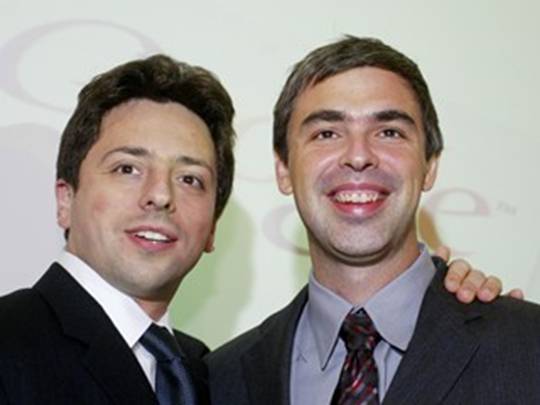Biography -- Larry Page [Cofounder of Google]
Ms. Jayshri Mandaviya |
Larry Page is the cofounder of Google and is currently the President of Products of for Google Inc.
Family Background
Lawrence E. Page was born in 1973 in Lansing, Lawrence Edward Page was born in Lansing, Michigan. His father, Dr. Carl Victor Page, was a professor of computer science and artificial intelligence at Michigan State University, where Lawrence's mother, Gloria, also taught computer programming. The Page family home was full of first-generation personal computers and scientific magazines, and young Larry, as he was called, immersed himself in them. Significantly, his older brother, Carl Page, Jr., also became a successful Internet entrepreneur.

Educational Background
Larry Page attended a Montessori school in the primary grades and later graduated from East Lansing High School. He was an honors student at the University of Michigan, where he also participated in the University's solar car team, reflecting another lifelong interest: sustainable transportation technology. After graduating with a B.S. in computer engineering, he undertook graduate studies in computer science at Stanford University in Palo Alto, California. It was here that he first undertook the project of analyzing patterns of linkage among different sites on the World Wide Web
Beginning of the GOOGLE
After graduating from East Lansing High School he studied for a Bachelor of Science degree in computer engineering from the University of Michigan and went on to study a Masters degree at Stanford University. While studying at Stanford University, Page was introduced to Sergey Brin. The two did not start out as friends, seeming to disagree on most topics of conversation, but eventually came across a subject that had been a great interest to them both. That topic was retrieving information from large data sets. The pair later wrote what is widely considered their seminal contribution, a paper called "The Anatomy of a Large-Scale Hyper textual Web  Search Engine". The paper has since become the tenth most accessed scientific paper at Stanford University.
Search Engine". The paper has since become the tenth most accessed scientific paper at Stanford University.
For a time, Page and Brin ran the prototype of their search engine, which they named "BackRub," on an assortment of inexpensive personal computers stored in Larry Page's dorm room. Word quickly spread beyond the walls of Stanford that the two graduate students had created something far more useful than existing search technology.
BackRub operates on Stanford servers for more than a year -- eventually taking up too much bandwidth to suit the university. In 1997 Larry and Sergey decide that the BackRub search engine needs a new name. After some brainstorming, they go with Google -- a play on the word "googol," a mathematical term for the number represented by the numeral 1 followed by 100 zeros. The use of the term reflects their mission to organize a seemingly infinite amount of information on the web.
Financial Help
Their technology was solid, but not solid enough to impress either the money boys or the major internet portals, so they continued struggling for financial support. Enter Andy Bechtolsheim, a founder of Sun Microsystems, who was one of the few to see the true potential of what Brin and Page had wrought. During their presentation to him, Bechtolsheim said he had to duck out for another meeting and offered to write them a check. So in Agust 1998 Sun co-founder Andy Bechtolsheim writes a check for $100,000 to an entity that doesn't exist yet: a company called Google Inc.
It was that hundred-grander, made out to Google Inc., that got the ball (and the bank) rolling. Brin and Page incorporated, managing to attract other investors, with an initial investment of around $1 million.
With its first corporate headquarters located in a friend's garage in Menlo Park, California, Google's search engine was already getting 10,000 queries a day while still in beta.
In December, 1998 "PC Magazine" reports that Google "has an uncanny knack for returning extremely relevant results" and recognizes us as the search engine of choice in the Top 100 Web Sites for 1998.
Google start
The domain name was derived from the term "googol," the very large number written as a one followed by 100 zeros, an expression of the vast universe of data the Google search engine was designed to explore. Page and Brin incorporated Google as a privately held company in 1998 and relocated their servers from Larry Page's dorm room to a friend's garage in Menlo Park, California. Having completed their Master's degrees, they took a leave of absence from the Ph.D. program to concentrate on building their business. At first, Larry Page served as the company's CEO, Sergey Brin as its President. Their stated Mission was "To Organize The World's Information And Make It Universally Accessible And Useful."
After quickly outgrowing a series of office locations, the company leased a complex of buildings in Mountain View, California in 1999. Google has since purchased the entire property, known as the GooglePlex, one of the most unusual and innovative workplaces in the world. In 2000, they began selling text-based advertisements associated with  search keywords. The text-only ads on their graphics-free home page kept their download time to the bare minimum, and their ability to deliver ads directly related to the interests of the user made the ad space highly valuable.
search keywords. The text-only ads on their graphics-free home page kept their download time to the bare minimum, and their ability to deliver ads directly related to the interests of the user made the ad space highly valuable.
In year 2000, Larry Page and Sergey Brin, still enrolled as Ph.D. candidates at Stanford, attended the Academy of Achievement's International Achievement Summit in London, England as graduate student delegates. The interview recorded at that time can be read on this web site. They returned to the annual event in 2004 as recipients of the Academy's Golden Plate Award.
By 2001, a vast number of once-promising Internet start-ups had folded, but Google was growing explosively and turning a profit. Page and Brin recruited Novell executive Eric Schmidt to serve as CEO, with Larry Page taking the role of President for Products, and Sergey Brin as President for Technology. The three have continued to run the enterprise as a triumvirate ever since.
Financing and initial public offering
The first funding for Google as a company was secured in the form of a $100,000USD contribution from Andy Bechtolsheim, co-founder of Sun Microsystems, given to a corporation which did not yet exist. Around six months later, a much larger round of funding was announced, with the major investors being rival venture capital firms Kleiner Perkins Caufield & Byers and Sequoia Capital.
On April 29, 2004, Google made an S-1 form SEC filing for an IPO to raise as much as $2,718,281,828. This alludes to Google's corporate culture with a touch of mathematical  humor as e ≈ 2.718281828
humor as e ≈ 2.718281828
The initial offering of shares was sold for $85 a piece. The public valued it at $100.34 at the close of the first day of trading, which saw 22,351,900 shares change hands.
Google's initial public offering took place on August 19, 2004. A total of 19,605,052 shares were offered at a price of $85 per share. Of that, 14,142,135 (another mathematical reference as √2 ≈ 1.4142135) were floated by Google and 5,462,917 by selling stockholders.
The company is listed on the NASDAQ stock exchange under the ticker symbol GOOG.
Growth of Google
A number of Google employees with shares in the company became millionaires overnight, and Larry Page and Sergey Brin found themselves multi-billionaires at age 27. Google was an immediate favorite with individual investors and the stock price has soared. All three top executives -- Larry Page, Sergey Brin and E ric Schmidt -- have reduced their annual salaries to a dollar a year and refused bonuses, tying their personal wealth directly to the company's performance in the stock market.
The company has continued to grow dramatically, through strategic alliances with AOL and Netscape, along with a number of cunning acquisitions, most spectacularly that of online video site YouTube for $1.65 billion in 2006. Google has introduced a number of popular new services and applications, including a toolbar that allows users to perform searches from their desktops, without visiting the Google web site. The web site itself enables searches for video and still imagery as well as HTML documents. Google also provides a free web-based e-mail service called G-Mail. Google Apps Premium Edition offers a suite of business tools including e-mail, word processing and spreadsheet applications at a fraction of the cost of competing office software packages. One of Google's most dramatic projects is Google Earth, which allows users to access satellite imagery to zoom in on locations all over the world. The most ambitious project of all, Google Book Search, aims to make the contents of vast libraries of books available and searchable online.
By the end of 2006, Google had over 10,000 employees and annual revenues well over $10 billion. Various estimates place Larry Page and Sergey Brin among the two dozen richest people on earth, and the dozen richest Americans. Despite its enormous success, Google has largely succeeded in preserving a uniquely informal and creative atmosphere at its Mountain View campus. In 2007, Fortune magazine, in its annual Top 100, ranked Google as the best company in the world to work for.
Larry Page Quotes
The ultimate search engine would basically understand everything in the world, and it would always give you the right thing. And we're a long, long ways from that.
If you can run the company a bit more collaboratively, you get a better result, because you have more bandwidth and checking and balancing going on.
We don't have as many managers as we should, but we would rather have too few than too many.
Basically, our goal is to organize the world's information and to make it universally accessible and useful.
You don't need to have a 100-person company to develop that idea.
The Star Trek computer doesn't seem that interesting. They ask it random questions, it thinks for a while. I think we can do better than that.
Reference:
http://www.achievement.org/autodoc/page/pag0bio-1
http://www.woopidoo.com/business_quotes/authors/larry-page-quotes.htm
http://en.wikipedia.org/wiki/Larry_Page
http://www.google.com/corporate/history.html
http://en.wikipedia.org/wiki/History_of_Google
